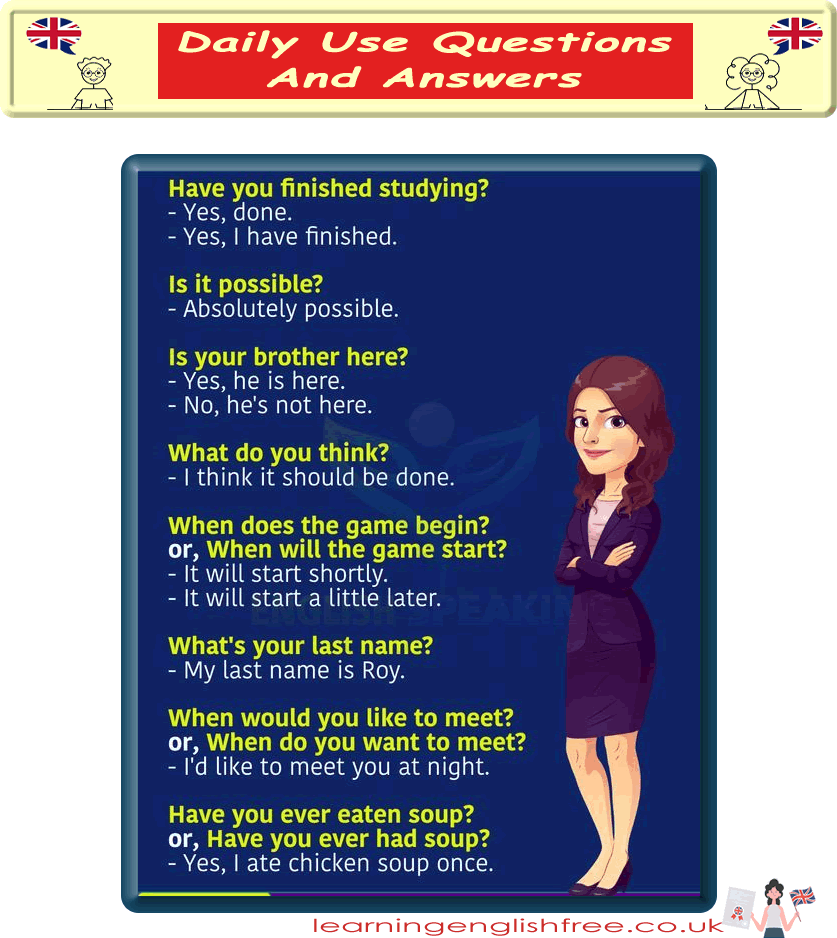
Navigating Daily Conversations in English
Navigating daily conversations in English can be a significant challenge for ESL learners. The ability to ask and answer questions effectively is crucial for everyday interactions, whether in a social setting, the workplace or while travelling. This comprehensive lesson is designed to demystify common English questions and answers, providing learners with the tools they need to communicate confidently and effectively.
Introduction to Daily Conversations in English
Understanding the structure and nuances of daily use questions and answers in English is essential for anyone looking to enhance their language skills. This lesson focuses on practical, everyday interactions that form the backbone of English communication. By mastering these, learners will not only improve their conversational abilities but also gain a deeper understanding of English grammar and vocabulary.
Useful Vocabulary for Daily Use Questions and Answers
Before we dive into the specifics, it's important to familiarize yourself with some key vocabulary and phrases. This lesson will cover a range of common questions and their typical responses, equipping you with the language necessary for a variety of everyday situations.
Detailed Guide on Daily Use Questions and Answers
-
Have you finished studying?
- Meaning: This question is used to inquire whether someone has completed their study activities.
- Example: "Yes, done. I can now focus on something else."
-
Is it possible?
- Meaning: This question asks about the feasibility or likelihood of an action or event occurring.
- Example: "Absolutely possible. We just need a bit of creativity."
-
Is your brother here?
- Meaning: Used to inquire about the presence of someone's brother in the immediate vicinity.
- Example: "No, he's not here at the moment. He'll be back later."
-
What do you think?
- Meaning: A question inviting someone's opinion or thoughts on a particular matter.
- Example: "I think it should be done. It's the best course of action."
-
When does the game begin?
- Meaning: Asking about the start time of a particular game or event.
- Example: "It will start a little later than planned. Let's wait."
-
What's your last name?
- Meaning: A question to inquire about someone's family name.
- Example: "My last name is Roy. It's quite common in my country."
-
When would you like to meet?
- Meaning: Asking about someone's preference for the timing of a meeting.
- Example: "I'd like to meet you at night. It's more convenient for me."
-
Have you ever eaten soup?
- Meaning: Inquiring whether someone has had the experience of eating soup at any point.
- Example: "Yes, I ate chicken soup once. It was quite memorable."
By familiarizing yourself with these questions and their appropriate responses, you'll be better prepared to engage in a wide range of English conversations.
Summary and Takeaways
Mastering the daily use of questions and answers in English is a fundamental aspect of becoming fluent in the language. It's important to practice these questions and answers regularly, both in formal educational settings and in everyday life. To reinforce your learning, consider:
- Practising with a study partner or in language exchange groups.
- Incorporating these phrases into your daily English conversations.
- Listening to English media, such as podcasts or videos, to hear how these questions and answers are used in real-life situations.
Sharing your learning journey with others can also be incredibly beneficial. Not only does it provide you with support and motivation, but it also offers the opportunity to learn from the experiences of fellow language learners.
We encourage you to share this lesson and your experiences on social media platforms like Facebook. Join our community at www.facebook.com/learningenglishfree.co.uk for more lessons, tips, and support from fellow ESL learners and educators. Engaging with a community of learners can provide you with additional resources, answer your questions, and offer encouragement throughout your language learning journey.
